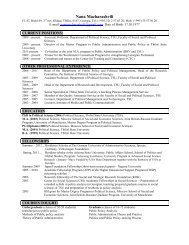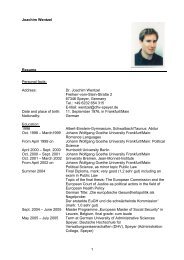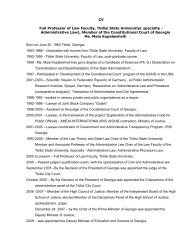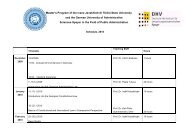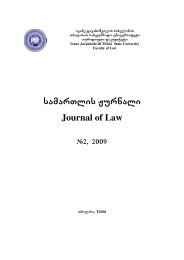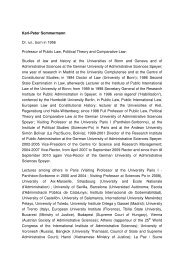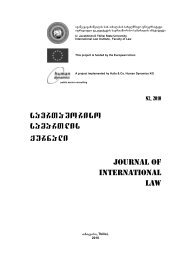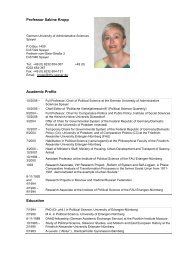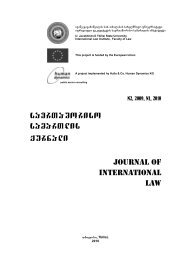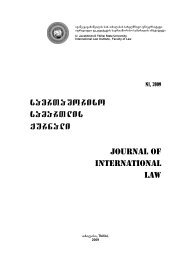Untitled
Untitled
Untitled
Create successful ePaper yourself
Turn your PDF publications into a flip-book with our unique Google optimized e-Paper software.
L. PAPIASHVILI, SOME ISSUES OF JUVENILE JUSTICE<br />
Moreover, article 40 covers the rights of<br />
all children in conflict with the law relates to matters<br />
such as the principle of nullum crimen sine<br />
lege; the minimum procedural safeguards to<br />
be guaranteed at all stages of penal proceedings;<br />
the establishment of laws, procedures,<br />
authorities and institutions specifically applicable<br />
to children alleged as, accused of, or<br />
recognized as having infringed the Penal Law,<br />
including a minimum age for criminal responsibility;<br />
Treatment of children in conflict with<br />
law in a manner consistent with the promotion<br />
of the child’s sense of dignity and worth, which<br />
reinforces the child’s respect for the human<br />
rights and fundamental freedoms of others<br />
and which takes into account the child’s age<br />
and the desirability of promoting the child’s<br />
reintegration and the child’s assuming a constructive<br />
role in society and the availability of<br />
alternatives to institutional care. It requires<br />
States Parties to promote a distinctive system<br />
of juvenile justice with specific positive rather<br />
than punitive aims.<br />
Un Minimum Rules for the Administration<br />
of Juvenile Justice: The Beljinc Rules<br />
(1985) – The Beijing Rules were the first international<br />
legal instrument to lay down comprehensively<br />
rules for the administration of juvenile<br />
justice. They actually predate the UNCRC<br />
and are specifically mentioned in the Preamble<br />
of the latter.<br />
The Beijing Rules, provide guidance to<br />
States for the protection of children’s right and<br />
respect for their needs in the development of<br />
separate and specialised systems of juvenile<br />
justice.<br />
States are urged to use all the resources<br />
available, “including the family, volunteers and<br />
other community groups, as well as schools and<br />
other community institutions” to reach two goals:<br />
(1) to minimize necessity for “intervention<br />
under the law and<br />
(2) to reduce harm that may be caused<br />
by such intervention by “dealing with juveniles<br />
in conflict with the law effectively, fairly and<br />
humanely”.<br />
The Beijing Rules stipulate that detention<br />
should be used only as a last resort (ultimum<br />
refugium) and for the shortest possible period<br />
of time and therefore encourage the use<br />
of alternatives to institutionalisation to the<br />
maximum extent possible. Young people who are<br />
identified as having committed an offence are<br />
best helped by the principle of minimum intervention.<br />
According to the Beijing Rules the age of<br />
criminal responsibility should not be “too low,<br />
bearing in mind the facts of emotional, mental<br />
and intellectual maturity of the juvenile; basic<br />
procedural safeguards should be guaranteed<br />
at all stages of proceedings 3 ; preference<br />
should be given to diversion; pre-trial detention<br />
should be used “only as a measure of last<br />
resort and for the shortest possible period of<br />
time”, detainees should be kept separate from<br />
adults and should receive necessary care,<br />
protection and assistance; prohibition of capital<br />
or corporate punishment; strict limitation<br />
where deprivation of liberty is a possibility;<br />
least possible use of institutionalization. Treatment<br />
of juveniles placed in institutions should<br />
provide care, protection, education and vocational<br />
training; special attention to young<br />
female offenders, right to access for parents<br />
or guardians. Adequate academic and/or vocational<br />
training should be provided to ensure<br />
that “they do not leave the institution at an<br />
educational disadvantage”; possibility of frequent<br />
and early recourse to conditional release<br />
and etc.<br />
UN Guidelines for the Prevention of<br />
Juvenile Delinquency (The Riyadh Guidelines)<br />
– The Riyadh Guidelines represent a<br />
compre-hensive approach to prevention and<br />
social reintegration. Prevention or rather its<br />
goals shall not be limited to protection of societies<br />
or crime control but shall be informed by<br />
the well being of your person from the early<br />
childhood, which should be the “focus of any<br />
preventive program”. The Guidelines call for<br />
child-centered orientation, progressive delinquency<br />
prevention policies and continuous improvement<br />
and development of measures.<br />
The Riyadh Guidelines also call for the<br />
enactment of specific laws and procedures to<br />
promote and protect rights of juveniles; the<br />
decriminalization of status offences; the establishment<br />
of an office of ombudsman or similar<br />
independent body as well as the training<br />
of the personnel working with juveniles.<br />
Un Rules for Protection of Juveniles<br />
Deprived of Their Liberty: The JDLs –Compared<br />
to the Beijing Rules and Riyadh Guidelines,<br />
the JDLs set out far more detailed rules<br />
to follow focused on ensuring, even in the<br />
detention in closed facilities, full respect for the<br />
169



